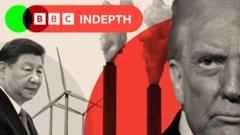Are UN Climate Talks Still Relevant?

Published: 2025-11-10 01:00:20 | Category: technology
The ongoing COP series, particularly COP30 in Brazil, highlights the shifting dynamics in global climate politics, as many key leaders, including the US and China, navigate their distinct energy agendas. The absence of numerous leaders raises questions about the effectiveness of such gatherings when the global commitment to climate action appears fragmented. The future of COPs may depend on individual nations' priorities rather than multilateral agreements.
Last updated: 03 October 2023 (BST)
What’s happening now
The COP30 summit in Brazil is currently underway, but it is marked by significant absences among global leaders. Notably, the leaders of China and India are absent, along with President Trump from the United States, who has withdrawn from the Paris Agreement and is not sending high-level officials to the talks. This absence raises critical questions about the future of international climate collaboration and whether the COP format can still drive meaningful progress in combating climate change.
Key takeaways
- The COP30 summit sees the absence of key leaders, including those from China and the US.
- Former leaders and climate experts are questioning the effectiveness of the COP format.
- Trump's administration has rolled back climate initiatives, impacting global cooperation.
- China is emerging as a clean-tech superpower, complicating global energy politics.
- Future climate negotiations may pivot towards bilateral agreements rather than multilateral commitments.
Timeline: how we got here
The COP series began in 1995, culminating in pivotal moments such as COP21 in Paris in 2015, when the landmark Paris Agreement was established. The recent years have seen increasing tensions in climate diplomacy:
- 2015: COP21 Paris Agreement is adopted, aiming to limit global warming to below 1.5°C.
- 2017: President Trump announces the US withdrawal from the Paris Agreement.
- 2021: COP26 in Glasgow sees renewed commitments from many nations, despite the absence of some key players.
- 2023: COP30 in Brazil is marked by significant absences, indicating a shift in the global climate landscape.
What’s new vs what’s known
New today/this week
The ongoing COP30 summit has revealed a stark decrease in high-level participation, raising concerns about its legitimacy and effectiveness. Key leaders' absences signal a potential turning point in international climate negotiations.
What was already established
Prior COP meetings established frameworks and agreements aimed at reducing global carbon emissions. However, the effectiveness of these agreements has been called into question as emissions continue to rise despite numerous pledges.
Impact for the UK
Consumers and households
With climate commitments wavering, UK consumers may face uncertainty regarding energy prices and the transition to renewable energy sources. A lack of robust international agreements could delay the implementation of clean energy initiatives.
Businesses and jobs
UK businesses may find themselves navigating a landscape of increased competition for clean technology innovations. Multinational corporations may also reassess their investment strategies in light of shifting regulatory environments and international agreements.
Policy and regulation
The UK government faces pressure to maintain its climate commitments while addressing the reality of international dynamics influenced by major players like the US and China. Upcoming consultations and policy decisions will be crucial in shaping the UK's climate strategy amidst these challenges.
Numbers that matter
- 40%: The percentage of China's economic growth driven by clean technologies in 2023.
- 15%: The European Commission's target for capturing a share of the €2 trillion renewable market by 2033.
- 80%: China's share of global solar panel production.
- 60%: The proportion of wind turbines produced by China globally.
- 1.5°C: The target for limiting global warming set in the Paris Agreement, which is now at risk of being breached.
Definitions and jargon buster
- COP: Conference of the Parties, an annual summit aimed at negotiating international climate agreements.
- Paris Agreement: A legally binding international treaty on climate change adopted in 2015.
- Renewables: Energy sources that are replenished naturally, such as solar, wind, and hydroelectric power.
How to think about the next steps
Near term (0–4 weeks)
As COP30 progresses, nations will need to engage in discussions to maintain momentum on climate commitments despite the absence of key leaders. Immediate actions include reaffirming existing pledges and outlining future cooperation strategies.
Medium term (1–6 months)
In the coming months, countries will likely reassess their commitments based on the outcomes of COP30. This period may see countries exploring bilateral agreements to ensure continued progress on climate initiatives.
Signals to watch
- Responses from major economies regarding their commitments post-COP30.
- New policies or initiatives announced by national governments to support clean energy transitions.
- Shifts in investment trends towards renewable technologies and sustainable practices.
Practical guidance
Do
- Stay informed about national climate policies and international agreements.
- Support local initiatives aimed at promoting renewable energy.
- Engage with businesses that prioritise sustainability in their practices.
Don’t
- Ignore the implications of shifting international relations on climate policies.
- Overlook the importance of personal action in promoting sustainability.
- Assume that climate commitments alone will drive change without public support and participation.
Checklist
- Review your carbon footprint and explore ways to reduce it.
- Research renewable energy options available in your area.
- Consider supporting political candidates who prioritise climate action.
- Stay engaged with community discussions on climate initiatives.
- Monitor global climate news to remain aware of changes that may affect local policies.
Risks, caveats, and uncertainties
As the COP process evolves, there are questions surrounding its capacity to address the growing challenges of climate change. The absence of significant leaders may lead to a fragmented approach to climate action, and the potential for economic priorities to overshadow environmental commitments presents a substantial risk. Moreover, with the increasing influence of major powers like China and the US, smaller nations may feel pressured to align their policies with those of these superpowers, potentially undermining global efforts to combat climate change.
Bottom line
The future of international climate negotiations is uncertain, especially in light of the significant absences at COP30. As countries navigate their energy priorities, the COP format may need to adapt to remain relevant. A shift towards bilateral agreements and a focus on practical solutions could define the next steps in the global effort to combat climate change.
FAQs
What is the significance of COP30?
COP30 is crucial as it represents ongoing international efforts to address climate change, despite the notable absence of key leaders, which raises questions about its effectiveness.
How does Trump's administration affect global climate initiatives?
The Trump administration's withdrawal from the Paris Agreement and rollback of climate policies have significantly impacted global climate cooperation.
What is the role of China in the global energy market?
China is emerging as a clean-tech superpower, dominating the production of renewable energy technologies, which complicates the global energy landscape.



